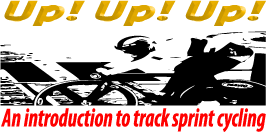06 - Consistancy
Fundamental principles :
To get better at something, do that something
To get worse at something, don't do that something
In designing a training plan, we recommend a consistent approach. We recommend repeating the same drills regularly. We want to see progressive overload and improvement and the only way to do that, is to do the same thing while we manipulate the load and/or the recovery period. An analogy. In the gym if you want to lift a heavy set of 5 squats, this is roughly what you'd do:
Do a set of 5 at a set weight, if you get it, next time, you make it heavier.
Repeat until plateau
Simple. Not easy. Don't confuse simple with easy. It's brutally hard, but it's simple.
The same thing applies on the velodrome. If you want to accelerate from 90 to 135rpm to a high speed over a set distance (say, 170m, roughly the acceleration phase of a flying 200) :
Pick an easy gear to start with. With a measuring device on your bike, start at 90rpm, accelerate to 135rpm in the distance set. If you hit the target cadence, increase the gear.
Rest, repeat.
Once you hit a plateau, you can start to manipulate recovery periods (maybe more?), or switch to a maintenance mode (same drill, same load, but less reps per week) and move to another phase of your training.
It's important to do this regularly, at least weekly. This way, you can see improvement - how? The gear gets bigger for the same cadence range. You're producing more torque, and thus, going faster. It's not boring, because you are seeing improvements and each individual training effort has a measurable, achievable goal. Boring is plateaus, not the reward of seeing that you're improving. It's easy to hide a plateau with random or constantly changing programs, and this is how some notorious fitness training programs keep their paying customers, but we are not about hiding, we want to know that what we're doing is working, and if it isn't because it has hit a plateau, we want to do something about it, quickly. We don't want to wait until our few chances at actual competition, to find out if what we're doing is working. If that's your plan, you're relying on luck.
If we are consistent and we're measuring what we're doing, we're knowing, not guessing.
You can use a motorbike for these sorts of efforts too. If you're consistent you'll just go faster and have more fun using bigger gears, the principle is the same.
